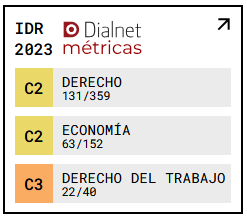The Ethics of Human Work, Artificial Intelligence and the Outlook in Latin America, Argentina and Uruguay
DOI:
https://doi.org/10.18172/redsye.6684Keywords:
Labor Law, labour relationship, artificial intelligence, gender, emotionsAbstract
This essay examines the compatibility between the ethics of human work and governance through Artificial Intelligence (AI) within Labor Law. It explores the anthropological conception of the human person and its relationship with AI, highlighting the power asymmetry in labor relations. The paper discusses AI’s impact on labor management, regulatory frameworks in Latin America, Argentina, and Uruguay, and the necessity of regulation to ensure transparent and rights-based governance. While AI can optimize processes, it cannot replace the emotional and experiential dimensions of human labor. The study emphasizes the need for a worker-centered regulatory approach to prevent job insecurity and rights violations.
Downloads
References
ADAMS-PRASSL, J et.al (2024) Towards an international standard for regulating algorithmic management: a blueprint. The Quest for labour rights and social justice. Work in a changing world. ISLSSL Rome XXIV. World Congress. Pag. 239.
AFFONSO SOUZA, C. et al. (2020) From privacy to data protection: the road ahead for the Inter-American System of human rights. The International Journal of Human Rights, vol. 25, núm. 1, 2020
AGUILAR CAVALLO, G. & SANDOVAL, M. La protección de datos personales en un contexto digital desde los estándares de la Corte Interamericana de Derechos Humanos. En AA.VV. (2023) Derecho digital y privacidad en América y Europa. Perspectiva chilena y comparada (ed. Droguett González, C & Walker silva, N). Tirant lo Blanch, págs. 195-204.
BAÑERAS, N. (2024) Spinoza y la no-dualidad. Ed. Kairós.
BARRETTO GHIONE, H. (2024) El derecho laboral en las plataformas digitales de trabajo. The Quest for labour rights and social justice. Work in a changing world. pag. 255.
BARRETTO GHIONE, H. (2013) Obligaciones en el contrato de trabajo: algunos problemas en la determinación y equivalencia de las prestaciones. (2013). Derecho Laboral. Revista De Doctrina, Jurisprudencia E Informaciones Sociales, 56(250), 309-326.
BAUMAN, Z. (2000) Trabajo, consumismo y nuevos pobres. Ed. Gedisa.
COPPOLETTA, S. (2022) El contrato relacional de trabajo. Ed. Rubinzal Culzoni.
CORTINA, A. (2024) ¿Ética o ideología de la inteligencia artificial? Ed. Paidós.
DURAND, C. (2020) Tehnofeudalisme. Critique de économie numérique. Éditions La Découverte.
FRANKFURT, H (2006) La libertad de la voluntad y el concepto de persona. En: Frankfurt, H. La importancia de lo que nos preocupa. Ed. Katz.
MARTÍNEZ, M. (2024) ¿De qué hablamos cuando hablamos de Inteligencia Artificial? UNESCO. UNESDOC. Biblioteca digital.
POLANYI, K. (2018) La gran transformación. Ed. FCE
RAZ, J. (1990) Razón práctica y normas. Centro de estudios constitucionales.
SADIN. E (2020) La inteligencia artificial o el desafío del siglo. Ed. Caja negra.
VAROUFAKIS, Y. (2024) Tecnofeudalismo. El sigiloso sucesor del capitalismo. Deusto.
ZINGALES, N. (2021) A Stronger Right to Data Protection During Pandemics? Leveraging The American Convention of Human Rights Against Governmental Inaction: A Brazilian Case-Study. Revista Brasileira De Direitos Fundamentais & Justiça, vol. 14, núm. 43, 2021, p. 450.
Downloads
Published
How to Cite
Issue
Section
License
Copyright (c) 2025 Sebastian Coppoletta, Rosina Rossi Albert

This work is licensed under a Creative Commons Attribution 4.0 International License.











